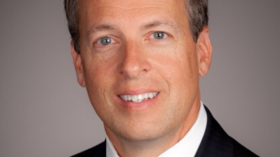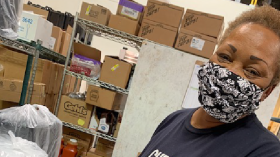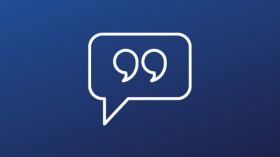
It was Easter 2020. The kids were hunting for Easter eggs while I was frantically looking for my notes. I was about to meet with my business client who was applying for the first round of the Paycheck Protection Program (PPP), an SBA-backed loan that helps businesses keep their workforce employed during the COVID-19 pandemic.
Juggling being a family and business man was quite the balancing act. The night prior, I was up until 3 a.m. working with another business client who was trying to correct the errors she made on her PPP application. The funds ran out in a matter of weeks and I felt at times like more of a therapist than a banker. The business community was scrambling, and to be honest, I was too. I did everything I could to relay timely information and found myself repeating the advice of a good friend: anxiety is relieved with information. So, I listened attentively during internal meetings and relayed what I knew. I felt a strong connection to the business community. A connection that to this day makes me happy that I chose the field of banking.
I always told myself that I wanted to choose a career where I helped people. So I studied political science in college and thought about being a lawyer. I took my LSAT practice exams and while working full time at the Bank and attending to my undergraduate degree, it seemed clear that I was enjoying the people aspect of banking.
I imagine that my experiences with PPP were no different than any other banker. During that time, I worked seven-day work weeks, and the intensity was nothing I had experienced in my near 30-year career. As I reflect back, I can’t help but think about what I could have done differently or better.
How can I become a more engaged banker? What can business and nonprofit clients do to better prepare to get access to capital? Who is the driver of this - the borrower or the lender? When is a good time to discuss credit needs? Why did so many businesses feel invisible to their banker during PPP?
As I look back on my experiences dealing with the Las Vegas community during those early months of COVID-19, I ask myself, “how could we have done better?” As I reflect on it today, I’ve come up with three main takeaways from those chaotic days.
The first takeaway was the significance of annual check-ups between a banker and a business client. Specifically, business financials are something that businesses should provide to their banker annually. This way, everyone can be proactive and the banker can educate their clients on any cash flow challenges or surplus. Many borrowers approach their banker when they need money and time is of the essence. I wonder how much more would get accomplished if a borrower proactively reviews their business returns and other financials annually for a check-up, as we do with our doctors every year.
This offensive strategy can prove useful to determine how much money a company really needs and uncover how to best manage cash flow. Of course nobody could have predicted the financial demands during the PPP days. However, a regular discussion about financials would have made the application process so much easier for both parties.
Access to capital now becomes easier for our community since bankers can guide borrowers to understand their true cash position. Business owners and non-profit leaders frequently set themselves up for failure by going into a bank unprepared. Three years of detailed financial statements, preferably prepared by an outside accountant, are usually required when applying for a loan. Most banks also request three years of business and personal tax returns. Why not have these in the bank file so that your banker can act quickly when you need funds?
The second takeaway is further deepening my appreciation of the power of personal relationships. This is a powerful tool for business owners and should be established before a business asks for money. This established relationship was missing for many during the PPP process. And when borrowers wanted help and reached out to a customer service number, they felt lost and unheard, leaving many frustrated and unable to access funds in time.
A banker can be a business and nonprofit’s best advocate. A sound partnership can help ensure not only access to funds, but a strong relationship beyond transactions. Establishing this clearly takes work, but the end result can be a trusted advisor who sees opportunity before it is needed, which can be critical to one’s success. Engaging with one another ensures access during tough times.
The final takeaway is the importance of how material is presented. This can best be accomplished by introducing your banker to your accountant.
The result is organized financials and an open line of communication. Ask your accountant to not only prepare the financial statements but review various financial issues so you can easily answer questions. Especially during uncertain times, this makes the loan process much smoother and helps get a timely response.
PPP is becoming a distant memory like my Easter family get-together in 2020. But every time a business reaches out for a loan request, I’ll never forget how we rallied together in early 2020. Many of our relationships were solidified and the business of friendship was introduced.
Bermudez is a Senior Vice President, Relationship Manager at Enterprise Bank & Trust, Member FDIC. He has more than 25 years experience in commercial banking and is committed to being a trusted financial advisor by delivering comprehensive financial solutions to our commercial and nonprofit clients in the greater Las Vegas area. Bermudez is dedicated to the Las Vegas community and serves on various boards and committees, including the Board of Advisors for Bridge Counseling Associates, Transition Services, Inc. and the Board of Directors for the YMCA of Southern Nevada.
Originally appeared in Las Vegas Weekly and https://vegasinc.lasvegassun.com/


